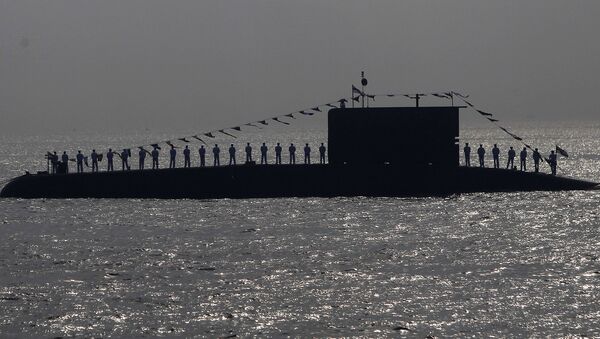NEW DELHI (Sputnik) — In what could be a major setback to French naval ship-building company DCNS, its proposal to set up a 100% Indian subsidiary for manufacturing air-independent propulsion systems (AIPS) for submarines is likely to be rejected by the Indian government.
Amit Cowshish, former financial adviser to the Ministry of Defense says, "They (DCNS) are offering something which is already available in India." The Defense Research Development Organization is already developing AIPs in collaboration with DCNS for Scorpene class submarines.
The FIPB had deferred a decision on the proposal two times earlier. "The decision has been deferred on an approval sought by DCNS to set up a company in India (IndiaCo) for the purposes of conducting the business of undertaking design and industrialization studies, research and development activities and manufacturing and maintenance in relation to air independent propulsion systems for submarines," FIPB said after its 236th meeting which was held on June 10. Subsequent meetings held on July 12 and August 3 did not mention DCNS's proposal in its agenda.
Cowshish says, "The Ministry of Defense is not in favor of this because this is something which is already being developed by DRDO. Therefore, the foreign investors also have to keep this in mind. Something that is already available or is being developed in India, even in an area where there is 100% foreign direct investment (FDI), will not mean anything. So, it has to be something which India is hungry for."
Air independent propulsion systems are expensive and can be retrofit in old ships to enhance the survivability of the submarines. It uses a limited amount of stored liquid gas which ultimately is used to charge the battery of submarines. Due to this, submarines can remain in water for longer periods. Otherwise, submarines have to come back to the surface to charge their batteries.
In June this year, India had tweaked FDI norms for the defense sector. According to the new norm, "foreign investment beyond 49% has now been permitted through government approval route, in cases resulting in access to modern technology in the country or for other reasons to be recorded. The condition of access to ‘state-of-the- art' technology in the country has been done away with."
Cowshish says, "FDI proposals for 100% have to be in areas where India lacks either the existing capabilities or is not even developing it."


